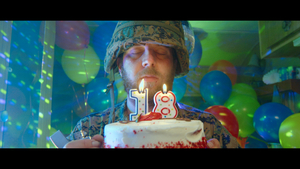Review: SOLDIER SONGS, THE MOVIE
The Reality of War and its Effect on Warriors

Soldier Songs is a filmed opera that tells about the life and memories of a returning soldier. Composer and librettist David T. Little says this concept took shape when Johnathan McCullough approached Little with an idea for a production of the opera involving an Airstream. When the pandemic happened and programming had to get shifted around, Opera Philadelphia got involved, and the opera became a movie. Somewhere along the way, the Airstream became a more ordinary junkyard trailer. The new film of David T. Little's Soldier Songs premiered January 22, 2021, on the Opera Philadelphia Channel. This reviewer saw it on January 23.
Companies in Los Angeles, San Diego, and several other cities have staged imaginative versions of this piece which combines elements of theater, opera, and rock-style music. Originally commissioned by the Pittsburgh New Music Ensemble, Soldier Songs premiered in 2006. The opera also had a workshop premiere in New York City in 2008 with Beth Morrison Projects. Its full world premiere took place in 2011 at the International Festival of Arts and Ideas in New Haven, CT.
As a result of interviews with veterans of five wars, Soldier Songs traces shifts in the perception of war from child, to new recruit, to retiring elder. At first the would-be soldier plays with an action figure under a sign in his room saying "Kill 'em all." He sings about killing bad guys with funny names. The more I think about that the more it frightens me. He sings of shooting another country's soldier in the face so his mother cannot recognize him. Then the soldier tops this scene off with the idea that if he gets shot he'll simply play the game again. Here, Little gives his audience time to think with a piano interlude.
There are only seven instruments in the accompanying ensemble, but each has an important part to play. In 2012, Yuval Sharon wrote the following in the notes on the 2013 BMI CD Recording, "Music is a weapon of war. Rhythm organizes a soldier's training; song defines an army's morale and camaraderie; Metallica can prepare a soldier for battle. After the war, commemoration never happens without a band. Music is easily co-opted and made to serve a political or ideological message. But music is just as easily a vehicle for reflection, engagement, and emotional connection, and this is certainly what is achieved in Soldier Songs."
As time goes on, the warrior realizes that as a civilian all he thought about with regard to a stint in the military was a monthly check, college money, and free medical care. As a warrior, he has to think about preserving his life and killing those who are trying to kill him. He crawls through a field looking for a safe place. One soon hears "Bring back my son." Eventually the sounds of war let up so that only a ticking sound is heard. At other times the music seems to fight the lone voice singing this opera. Little sometimes incorporates a few notes from an older composer. Copland's Fanfare for the Common Man is one of his quotes that fits the Common Soldier very well.
We now know that many soldiers have PTSD when they return. They have changed personalities. They don't talk about what happened in Afghanistan, Iraq, or Vietnam because people who have not gone to war don't understand. Maybe those of us who have seen Soldier Songs a few times can begin to comprehend a tiny bit of what the soldier's mind encompasses. Composer David T. Little and stage director/baritone Johnathan McCullough have given us a key to understanding what war can do to children, spouses and military personnel.
Soldier Songs will be available on-demand from January 22, though May 31, 2021. It can be viewed as a seven-day rental for $25. Learn more at operaphila.tv. A free program featuring interviews with veterans accompanies the film on the Opera Philadelphia Channel.
Photo of Jonathan McCullough as The Soldier courtesy of Opera Philadelphia.
Reader Reviews
Videos

